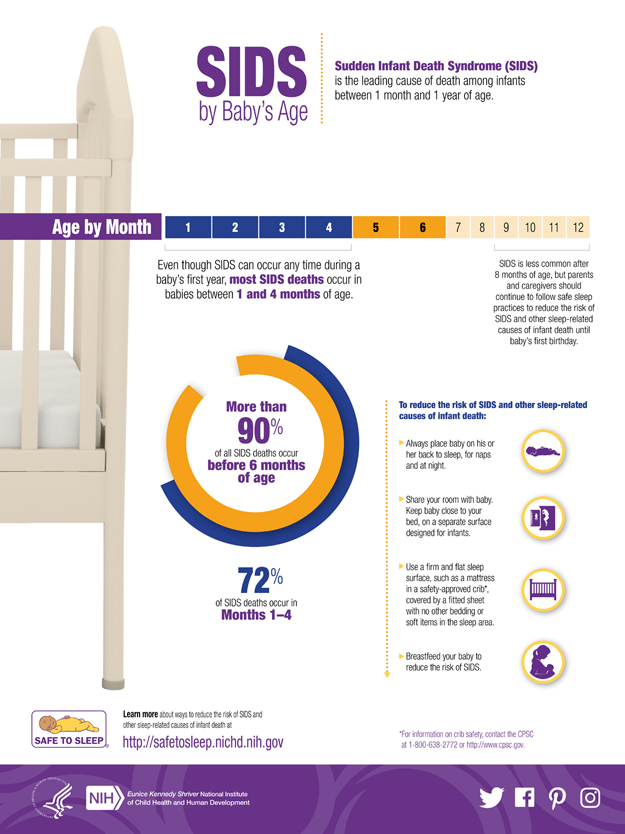Data and Statistics Data and statistics highlights Parents and Caregivers Creating a safe sleep environment, resources SUIDI Training Resources Materials for infant death investigators and instructors SUID and SDY Case Registry US Map About the registry, current awardees More Get Email Updates SIDS is up to 12.9 times more likely to occur in babies who sleep on their stomachs compared to babies who sleep on . Adult beds aren't safe for infants. It is not recommended. (The program is now called the "Safe Sleep" campaign.). "SUID is a term used to describe the sudden and unexpected death of a baby less than 1-year-old in which the cause was not obvious before presentation," says William Mudd, DO pediatrician at Cleveland Clinic Children's. This proves the efficacy of the Back to Sleep campaign. Being too warm while sleeping can increase a baby's risk of SIDS. A baby sleeping on their side has an increased risk of SIDS. Pre-Application Process for NICHD Network Multisite Clinical Research, NICHD Policies for Data & Safety Monitoring, Clinician-Scientist Investigator (CSI) Curriculum, Office of Administrative Management (OAM), Office of Data Science and Sharing (ODSS), Office of Legislation, Public Policy, and Ethics (OLPPE), Office of Science Policy, Reporting, and Program Analysis (OSPRA), Division of Population Health Research (DiPHR), NCMRR Funding Opportunity Announcements (FOAs), Snapshot of Pregnancy & Infant Development Advances, Snapshot of Adult & Family Health Advances, National Advisory Child Health and Human Development (NACHHD) Council, National Advisory Board on Medical Rehabilitation Research (NABMRR), Task Force on Research Specific to Pregnant Women and Lactating Women (PRGLAC), http://www.cdc.gov/nchs/data/nvsr/nvsr64/nvsr64_09.pdf, http://www.cdc.gov/nchs/data/nvsr/nvsr65/nvsr65_02.pdf, http://pediatrics.aappublications.org/content/128/5/e1341.full, http://pediatrics.aappublications.org/content/116/5/1245, Item of Interest: NICHD recognizes updated safe infant sleep recommendations, Release: NIH, DC government form partnership to reduce sleep-related infant deaths, Item of Interest: NICHD Partners with Safe Kids Worldwide to Enhance Community-Level Safe Infant Sleep Practices, National Child & Maternal Health Education Program. About 1,300 infants died due to SIDS in the US in 2018. Copyright 2023 American Academy of Pediatrics. If your baby's not interested in the pacifier, don't force it. show that in 1994, 27% of babies slept on their back, while in 2009, about 74% of caregivers said that they used the back sleeping position for their babies. In 1980, there were 153 SIDS deaths per 100,000 live births compared to 51.6 in 2010. Breastfeed ifpossible, and avoid smoking. Suffocation is one of them. Breastfeeding can lower the risk of SIDS by up to 50%. This stacked bar chart shows sudden unexpected infant death (SUID) rates by cause and by race/ethnicity in the United States from 2015 through 2019. Your baby is very young, small or was born prematurely. SIDS rates declined considerably from 130.3 deaths per 100,000 live births in 1990 to 38.4 deaths per 100,000 live births in 2020. Additionally, current US SIDS statistics show that about 1,300 infants died due to unknown reasons, while suffocation and strangulation in bed caused about 800 infant deaths in 2018. "SIDS is an absolutely devastating situation for families and we want to take all the preventative steps that we can to mitigate the risk," says Dr. Mudd. Mayo Clinic is a not-for-profit organization. At what age is a baby most likely to suffer from SIDS? Put a Sleeping Baby on Their Back. Bed-sharing can increase the risk of SIDS by five times among babies younger than three months old. Adjust this toolkits resources and messages to meet your organizations tone, communication needs, and goals for SIDS Awareness Month. Sudden unexpected infant deaths include sudden infant death syndrome (SIDS), accidental suffocation in a sleeping environment, and other deaths from unknown causes. This map shows how sudden unexpected infant death (SUID) rates varied by state from 2016 through 2020 among the 50 states and the District of Columbia. Some claim that breast milk boosts the babys immune system and protects them from infections that may increase the risk of SIDS. Please note, Internet Explorer is no longer up-to-date and can cause problems in how this website functionsThis site functions best using the latest versions of any of the following browsers: Edge, Firefox, Chrome, Opera, or Safari. Sadly, the world death rate among infants is much higherin 2017, it was 29 infant deaths per 1,000 live births. Age: Babies younger than 4 months old are at higher risk. CDC is not responsible for Section 508 compliance (accessibility) on other federal or private website. a mattress and a wall. However, the sleep environment may increase the risk of SIDS. These variances may be due to geographical location, socioeconomic factors, or differences in child care practices. show that it fell to 62.2 per 100,000 live births after only six years. Use a crib, bassinet, or portable play yard with a firm, flat mattressand a fitted sheet. Sudden Unexpected Infant Death (SUID), which includes Sudden Infant Death Syndrome (SIDS), is the leading cause of injury death in infancy. Unfortunately, we cant prevent SIDS. There were 20 or fewer deaths in Vermont. Keep loose blankets, pillows, stuffed toys, bumpers, and other soft items out of the sleep space. As you can see, based on recent SIDS facts and statistics, there was a considerable decline from 1990 when the SIDS rate was 130.3 deaths per 100,000 live births. The three commonly reported types of SUID include the following: In 2020, there were about 1,389 deaths due to SIDS, about 1,062 deaths due to unknown causes, and about 905 deaths due to accidental suffocation and strangulation in bed. Baby boys are at higher risk from the syndrome than girls. "A newborn baby will spend most of their day sleeping, even 20+ hours per day," says Dr. Ambler. Another common cause is entrapment, when a baby cant breathe because it gets stuck between two objects, e.g. Infographic PDF (542 KB) | Infographic JPG (574 KB), Copy and paste the code below to embed this infographic.